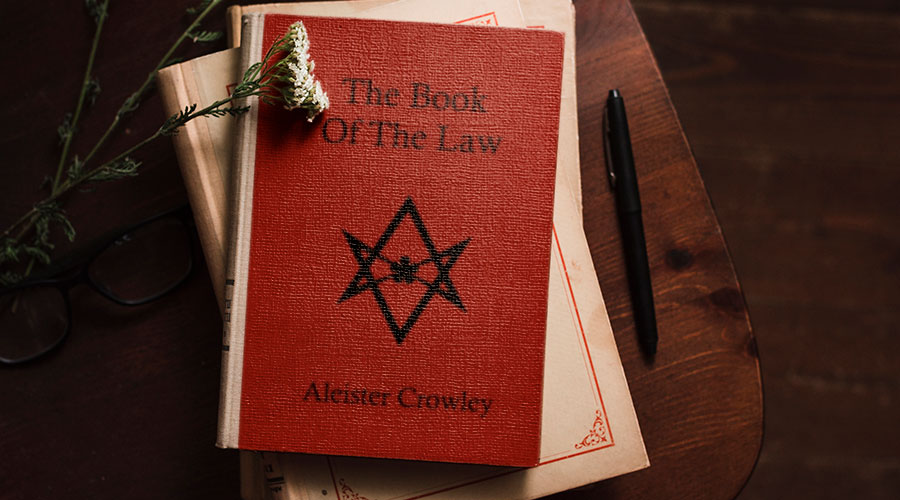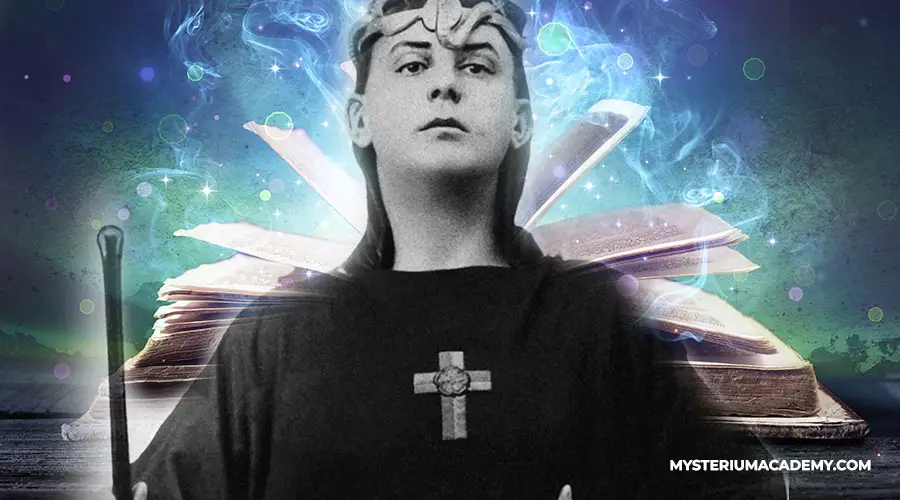A small book written in prose poem, the Book of the Law is one of those books that people read repeatedly throughout their lives. But it can be very confusing, and in this article, we are going to take a look at the contents of the book and offer some explanations.
The Book of the Law contains the core ideas of Aleister Crowley’s religion called Thelema. He received the book when he channeled a higher being name Awaiss, and it discuss the beginning of the Aeon of Horus, the nature of your True Will, the Scarlet woman, and the magical word Abrahadabra.
During the channeling session, Crowley received messages from three beings named Nuit, Hadit, and Ra-Hoor-Khuit. A chapter is dedicated to each of their messages, which are full of Hermetic and Kabbalistic references.
Aiwass, and the Channeling of the Book
While Crowley is the author of the book, the story goes that he received the book in a channeling, from a higher consciousness named Aiwass. This occurred in 1904 in Cairo, Egypt, while Crowley and his wife, Rose Edith Kelly were on their honeymoon. For three days, April 8, 9, 10, Crowley heard a voice speaking to him from noon to 1pm each day. Later in life he described the experience as a voice coming over his shoulder from the corner of the room, with a neutral accent and deep timbre. The voice dictated the Book of the Law to Crowley, who at first was not sure what to make of it, not even publishing it until five years later in 1909. Eventually though, he made it the central book in his religion, which he called Thelema.
The New Aeon of Horus
Crowley believed that the channeling of the Book of the Law marked the beginning of the New Aeon of Horus, or the time of Thelema. According to Thelema, history is divided in aeons, which are like periods of times or chapters, that each have their own characteristics. The first was the Aeon of Isis, which occurred in prehistorical times and focused on goddess worship. Next came the Aeon of Osiris, the time of patriarchy during the the classical and medieval times, when people worshipped a monotheistic, or singular, male god.
When Crowley received the Book of the Law, he declared it to be the beginning of the new aeon, the Aeon of Horus, the child god. Symbolized by Horus the falcon-headed Egyptian god, the Aeon of Horus is the time of human self-realization.

Diving into the Contents of the Book of the Law
When Crowley connected with Aiwass, he then began to receive messages from three other beings: Nuit, Hadit, and Ra-Hoor-Khuit, in that order. They each give Crowley a message, which together form the core ideas of the Thelemic religion he created. The Book of the Law contain three chapters in which each of the beings communicate their messages.
Nuit
A goddess in Thelema, not unlike Nut the Egyptian Sky Goddess. She is also the divine feminine. The first chapter of the Book of the Law is her speaking. She is known by different names, including “Queen of Infinite Space”, “Our Lady of the Stars”, and “Lady of the Starry Heaven”.
Hadit
The counterpart to Nuit, Hadit is the divine masculine, and the speaker of the second chapter. In Thelemic philosophy he is regarded as the center of the circle, and the axle of the wheel. He is the Holy Ghost, and “the flame that burns in every heart of man, and in the core of every star”.
Ra-Hoor-Khuit
The third chapter is the message from Ra-Hoor-Khuit, the Magical Child. His name means Ra (who is) Horus of the Horizon, in reference to the new Aeon of Horus that, in which Horus will usher in a time of human self-realization. The Book of the Law describes Ra-Hoor-Khuit as the god of war and vengeance, the Lord of the Aeon, the Crowned and Conquering Child.
The messages of the three beings, each which have a very different tone and feel to them, combine to make up the core of the Thelemic system of philosophy and magic. Below are some of the most important concepts from the Book of the Law:
Every man and every woman is a star
This quote comes from chapter one, in Nuit’s message. I interpret it to mean that every individual is a creation of the universe, and therefore a microcosm of all that is. While we do have free will, our path through life fits into the bigger picture like a small component in the watch, and everything works together. This leads to the next concept:
Do what thou wilt shall be the whole of the Law
This is a well-known, controversial, and in my opinion, often misinterpreted line from the book. When Crowley says the law is only to do what your will tells you do to, he is not saying you can do whatever you want without repercussions. He is saying that the law is to follow your will, or True Will, which is a very specific thing, since you exist as an individual star of the universe, with a unique will that dictates to you to live out the destiny you were born to live.
True Will
An important concept in Thelema, your True Will is what you feel compelled to do in your life. Rather than coming from your thoughts, it comes from a much deeper place, from where your deepest self and the universe become one. True Will is NOT the ordinary wants and desires of the ego.
The Scarlet Woman
The term Scarlet Woman was used in Catholicism to mean a prostitute, however Thelema repurposed the term in the Thelemic system of ceremonial magic. In Thelema, the Scarlet Woman is in reference to the goddess Babalon, who represents female sexuality and female liberation.
Abrahadabra
The Book of the Law is considered the first time the word Abrahadabra was used publicly. Crowley described it as “the word of the Aeon”. He stated that each of the Aeons have their own magical formula, and as we entered the Aeon of Horus, Abrahadabra is this aeon’s formula. The word is found repeatedly in the Book of the Law, and contains interesting numerological attributes, according to Kabbalah. It is often interpreted to mean “I create as I speak”.

The Comment
An interesting detail of the book comes at the end, in the section called “The Comment”, This is a warning that says you should not share this book with others, lest you be a center of pestilence.
Hermeticism and Kabbalah: Recommended Prerequisites to the Book of the Law
To those who read the Book of the Law for the first time, it’s probably not going to make a whole lot of sense. Certainly, there is an undeniable richness and poeticness to it, however to get insights into the magical nature of the universe may seem difficult. This is because Crowley make extensive use of references to Hermetic and Kabbalistic concepts. Having somewhat of an understanding of these two fields of study will help you greatly in your understanding of the Book of the Law.
Recommended Reading
If you want to continue exploring this subject more deeply, you can see which books I recommend by clicking here.

